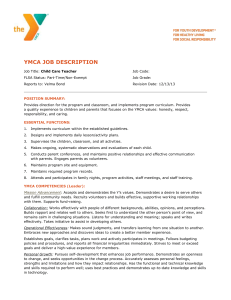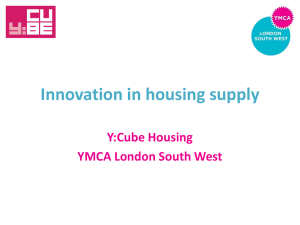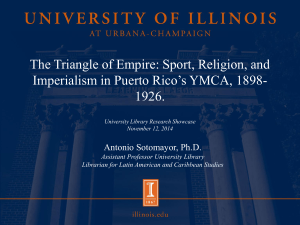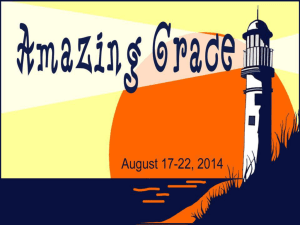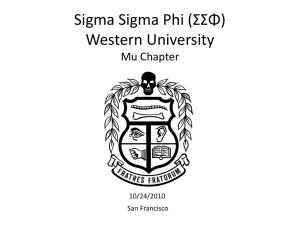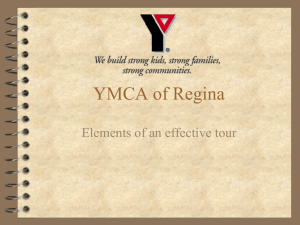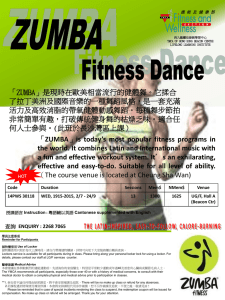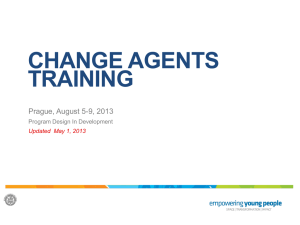Telephone Survey - YMCA Partnership
advertisement
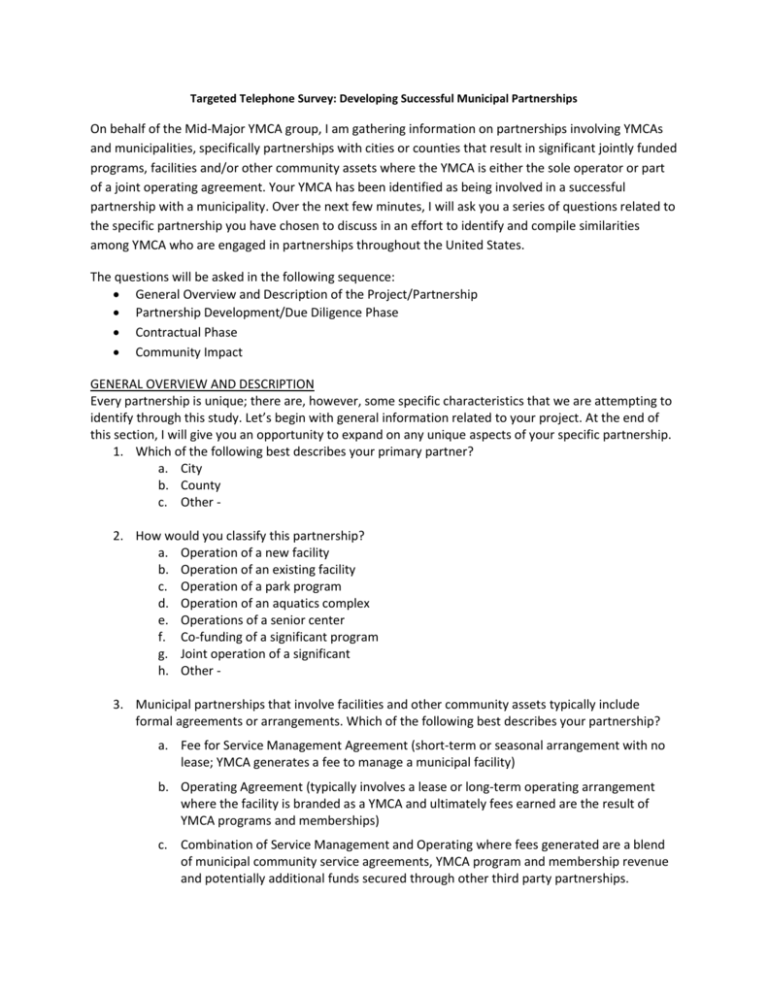
Targeted Telephone Survey: Developing Successful Municipal Partnerships On behalf of the Mid-Major YMCA group, I am gathering information on partnerships involving YMCAs and municipalities, specifically partnerships with cities or counties that result in significant jointly funded programs, facilities and/or other community assets where the YMCA is either the sole operator or part of a joint operating agreement. Your YMCA has been identified as being involved in a successful partnership with a municipality. Over the next few minutes, I will ask you a series of questions related to the specific partnership you have chosen to discuss in an effort to identify and compile similarities among YMCA who are engaged in partnerships throughout the United States. The questions will be asked in the following sequence: General Overview and Description of the Project/Partnership Partnership Development/Due Diligence Phase Contractual Phase Community Impact GENERAL OVERVIEW AND DESCRIPTION Every partnership is unique; there are, however, some specific characteristics that we are attempting to identify through this study. Let’s begin with general information related to your project. At the end of this section, I will give you an opportunity to expand on any unique aspects of your specific partnership. 1. Which of the following best describes your primary partner? a. City b. County c. Other 2. How would you classify this partnership? a. Operation of a new facility b. Operation of an existing facility c. Operation of a park program d. Operation of an aquatics complex e. Operations of a senior center f. Co-funding of a significant program g. Joint operation of a significant h. Other 3. Municipal partnerships that involve facilities and other community assets typically include formal agreements or arrangements. Which of the following best describes your partnership? a. Fee for Service Management Agreement (short-term or seasonal arrangement with no lease; YMCA generates a fee to manage a municipal facility) b. Operating Agreement (typically involves a lease or long-term operating arrangement where the facility is branded as a YMCA and ultimately fees earned are the result of YMCA programs and memberships) c. Combination of Service Management and Operating where fees generated are a blend of municipal community service agreements, YMCA program and membership revenue and potentially additional funds secured through other third party partnerships. d. Joint-operation or funding of a significant program (the program may or may not be conducted at a municipal facility) 4. Partnerships often result from a perceived mutual value proposition. For the YMCA, the value proposition is commonly associated with mission expansion, capital funding, operating efficiencies, revenue generation and community benefit. Which of the following best describes the value proposition of the partnership to your YMCA? a. Expanded service area b. Capital funding c. Minimized risk associated with serving: i. An under-populated area ii. A low income area iii. A newly emerging market iv. A unique population d. Revenue generated from a management contract e. Joint-funding or another operational benefit related to the facilitation of a significant program 5. Beyond the general description captured in these questions, are there any unique aspects to your partnership that added to the value proposition for either partner? PARTNERSHIP DEVELOPMENT/DUE DILIGENCE PHASE Every partnership must have a starting point and then ultimately a tipping point that turns a good idea into reality. The next few questions will establish commonalities related to how these partnerships get started and what tips a partnership from the development phase to the contractual phase. 6. Which of the following best describes who initiated your partnership? a. YMCA (the YMCA sought out specific partners and presented an opportunity) (If YMCA) Which of the following allowed your initiative to be considered? i. Advocates within municipal leadership ii. Well-defined value proposition points for all parties iii. Pre-established community support iv. Third party statistical data which verified the community need v. Pre-cultivated relationships utilizing tours, awareness-building techniques vi. An RFP was developed and distributed to targeted partners by the YMCA vii. Other b. Municipality (the municipality sought out potential partners) (If Municipality) Which of the following best describes this process? i. The YMCA was the only agency contacted ii. The YMCA responded to a generally distributed RFP iii. The YMCA responded to a RFP developed specifically for the YMCA iv. The YMCA was requested to provide information for a municipal work session v. Other - 7. Which of the following professional services were utilized in the development process and to what extent did you use them? a. Market Research Consultants b. Fundraising Feasibility Consultants c. YMCA of the USA d. YMCA peers with relevant expertise e. Architects f. Engineers g. Contractor h. Other 8. Which of the following best describes the end result of the development process for your partnership? (If Facility) a. Market Research results including membership and program proforma that clearly defines projected service delivery opportunities and revenue generation potential b. YMCA operating proforma utilizing market research data c. Schematic facility design d. Preliminary construction budget based on schematic design, recent construction costs and escalation e. Potential fundraising target f. Preliminary operating budget utilizing all data gathered which established debt requirements, potential partner capital and operating subsidy and ramp-up timeline g. Project timeline h. An approved Memorandum of Understanding resulting from YMCA board action and municipal resolution i. Other (If Program) a. Market Research results including membership and/or program proforma that clearly defines projected service delivery opportunities and revenue generation potential b. YMCA operating proforma utilizing market research data c. Potential fundraising target d. Preliminary operating budget utilizing all data gathered which established debt requirements, potential partner operating subsidy and ramp-up timeline e. Project timeline f. An approved Memorandum of Understanding resulting from YMCA board action and municipal resolution g. Other 9. What was your YMCA’s financial investment during the development phase and what did it fund? 10. What was the financial investment of other partners during the development phase and what did it fund? 11. From start to finish, how long was the development phase? CONTRACTUAL PHASE The contractual phase of a municipal partnership ultimately outlines the specific parameters of expectations related to the operations of a facility and/or program. The goal during this section is to identify the most common key components of a municipal contractual agreement. 12. Which of the following best describes how the legal document was developed and funded? a. Jointly b. By the YMCA c. By the Municipality 13. Which of the following best describes the sequence of the contract ratification process? a. YMCA approval followed by municipality approval b. Municipality approval followed by YMCA approval 14. Which of the following best describes the length of your contract? a. 0-5 years b. 6-10 years c. 10-20 years d. 20-30 years e. 30 years+ 15. Which of the following key components were included in your contractual agreement? (If Facility) a. Ownership i. Land ii. Facility b. Design and Construction Funding (i.e. bonds, private donations, grants, debt) c. Lease Agreement i. Land ii. Facility d. Operating Agreement i. Operating Hours ii. Fees and Scheduling iii. Operational Subsidies (amounts and responsibility) iv. Daily Maintenance and Repair e. Term and Cancellation f. Construction of Improvements (funding and responsibility) g. Insurance Requirements and Responsibilities h. Disputes, Defaults, Remedies and Termination i. Tax Covenants (YMCA and Municipal) j. General Provisions k. Special Provisions l. Long Term/Major Facility Maintenance (amounts and responsibility) m. Applicable Attachments n. Other - (If Program) a. b. c. d. e. f. g. h. i. j. k. l. Description of Program Partner Responsibilities Participant Fees Participant Revenue Distribution Dates of Service Promotion and Public Relations Insurance Effective Date and Term of Agreement Modifications Indemnity and Release Sponsorship Proceeds Distribution Termination Agreement Other - COMMUNITY IMPACT 16. At the beginning of our conversation, you stated the intended value propositions of your partnership. In your opinion, were these successful, and if so, to what extent? a. YES b. NO 17. It is assumed that partnerships have a perceived economic impact. Was that perception realized and if so, can you quantify it for each partner? a. YES b. NO 18. Reflecting back on the partnership process, what advice would you offer other YMCA leaders as they consider entering into a partnership arrangement? 19. In your opinion, what were the greatest challenges/obstacles that you experienced throughout the process? 20. With regard to “lessons learned,” would you do anything differently with a new partnership based on your past agreements? If so, what? a. YES b. NO Thank you for your time and participation in this study. Relevant data gathered from respondents will be analyzed, compiled into a report and shared with senior YMCA leadership to support the successful development of sustainable municipal collaborations throughout the United States.
